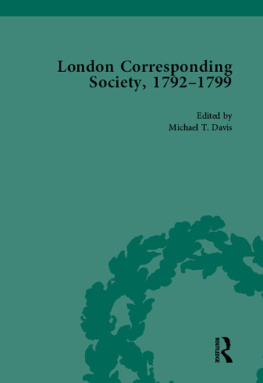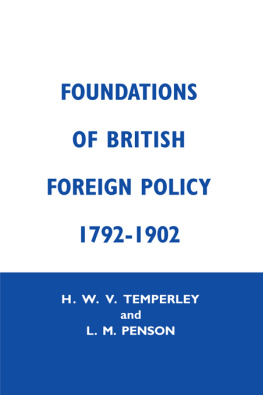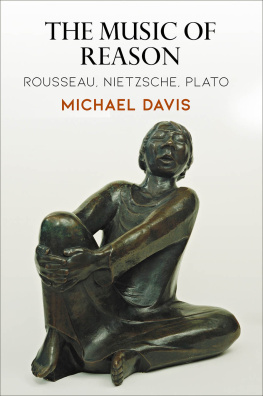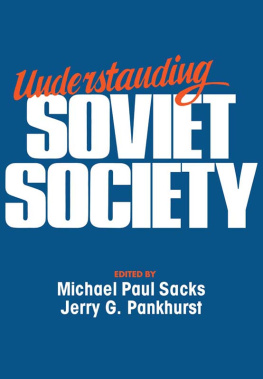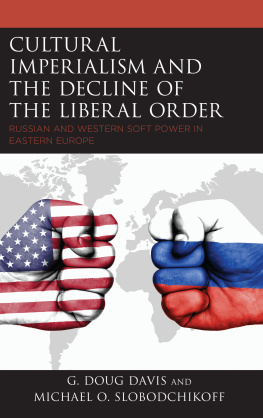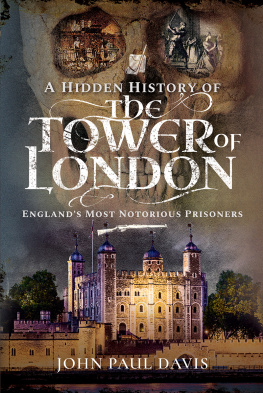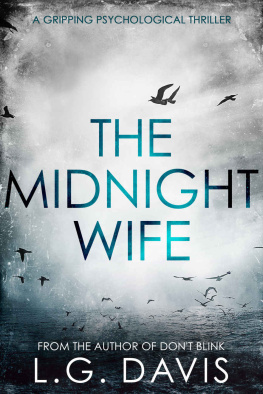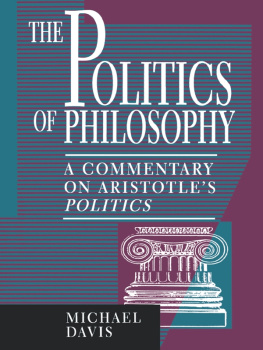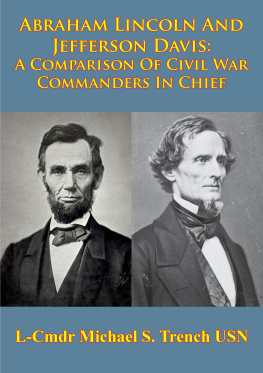LONDON CORRESPONDING SOCIETY, 17921799
Volume 6
LONDON CORRESPONDING SOCIETY, 17921799
Volume 6
Editor: Michael T. Davis
Advisory Editors:
James Epstein
Jack Fruchtman Jr
Mary Thale
First published 2002 by Pickering & Chatto (Publishers) Limited
Published 2016 by Routledge
2 Park Square, Milton Park, Abingdon, Oxon OX14 4RN
711 Third Avenue, New York, NY 10017, USA
Routledge is an imprint oof the Taylor & Francis Group, an informa business
Copyright Taylor & Francis 2002
All rights reserved, including those of translation into foreign languages. No part of this book may be reprinted or reproduced or utilised in any form or by any electronic, mechanical, or othe r means, now known or hereafter invented, including photocopying and recording, or in any information storage or retrieval system, without permission in writing from the publishers.
Notice:
Product or corporate names may be trademarks or registered trademark s, and are used only for identification and explanation without intent to infringe.
BRITISH LIBRARY CATALOGUING IN PUBLICATION DATA
London Corresponding Society: publications, 1792-1799
1. London Corresponding Society History 2. Radicalism Great Britain History 18th century 3. Working class Great Britain Political activity History 18th century 4. Social movements Great Britain History 18th century 5. Great Britain Politics and government 18th century
I.Davis, Michael T. II.Epstein, James III.Fruchtman, Jack IV.Thale, Mary
320.5 3 0941 09033
LIBRARY OF CONGRESS CATALOGING-IN-PUBLICATION DATA
The London Corresponding Society publications, 1792-1799 / edited by Michael T. Davis.
p. cm.
Includes index.
Contents: v. 1. Pamphlets, 1792-1794 v. 2. Pamphlets, broadsheets, and treasurers accounts, 1792-1798 v.3. Periodicals, 1794-1796 v. 4. Periodicals, 1797 v. 5.
Pamphlets relating to the London Corresponding Society, 1793-1797 v. 6. Parliamentary reports and debates, 1794-1799.
1. Great Britain Politics and government 1789-1820 Sources. 2. Working class England Political activity History 18th century Sources. 3 London Corresponding Society. I. Davis, Michael T., 1969- II. London Corresponding Society.
DA520 .L65 2001
941.073-dc21
200136919
ISBN-13: 978-1-85196-734-6 (set)
New material typeset by P&C
CONTENTS
Second report from the Committee of Secrecy of the House of Commons respecting seditious practices (1794)
Second report of the Secret Committee of the House of Lords respecting seditious practices (1794)
Debate in the Lords on the report of the Secret Committee respecting seditious practices (1794)
During the arrest of Thomas Hardy (17521832), secretary of the LCS, and Daniel Adams (fl. 178095), secretary of the Society for Constitutional Information, on 12 May 1794, government officials seized their personal papers and the records of their respective associations. The following day, the House of Commons approved a motion of the prime minister, William Pitt (17591806), that the confiscated documents be referred to a Secret Committee consisting of twenty-one members, including Pitt, Henry Dundas (17421811), Edmund Burke (172997), William Windham (17501810) and Thomas Grenville (17551846). The House of Lords also established a Secret Committee, to examine the evidence of subversive activities, which included William Henry Cavendish-Bentinck (17381809), but it was the Secret Committee of the House of Commons which was first to present its findings on 16 May 1794. The first report from the Committee of Secrecy of the House of Commons was an alarmist and expectedly reactionary assessment of radical activities and it was on the basis of this report that the suspension of Habeas Corpus passed through the Commons on 18 May 1794 by a vote of 146 to 28 and through the House of Lords four days later. The two reports and debates in the Lords reflect the governments general fear at the time, but the most significant parliamentary investigation into seditious activities was presented in the Second report from the Committee of Secrecy of the House of Commons, on 6 June 1794. It revealed the extent of cooperation between the reform societies of England and Scotland as well as the alleged revolutionary designs of radicals. In the months leading up to the infamous treason trials held between October and December 1794, at which Thomas Hardy, John Horne Tooke (17361812) and John Thelwall (17641834) were ultimately acquitted, the government pursued witnesses and reformers for evidence to support the Committee of Secrecys findings in the Second report. At a meeting of the LCS Committee of Emergency on 22 May 1794 a motion was put forward, somewhat ironically, for the Society to publish 10,000 copies of the Second report, for that Report contained at length many of [the] most pointed and the best resolutions which that Society had ever passed, and which at this time they would not dare to publish (Selections, p. ). The Committee, however, rejected the motion on the grounds that the financial position of the LCS at the time was too precarious to accommodate the suggested publication.
First Reportfrom the Committee of Secrecy of the House of Commons respecting Seditious Practices.] May 16. Mr. Pitt reported from the Committee of Secrecy, That the Committee had examined the masters to them referred, and had directed him to make a report to the House; and he read the Report in his place; and afterwards delivered it in at the clerks table: where the same was read; and is as followeth:
The COMMITTEE to whom the several Papers referred to in his majestys Message of the 12th of May, 1794, and which were presented (sealed up) to the House, by Mr. Secretary Dundas, upon the 12th and 13th days of the said month, by his majestys command, were referred; and who were directed to examine the matters thereof, and report the same, as they should appear to them, to the House; have proceeded, in obedience to the orders of the House, to the consideration of the matters referred to them.
They find, on the first inspection, that the books and papers which they are directed to examine, contain a full and authentic account of certain proceedings of two societies, calling themselves the society for Constitutional Information, and the London Corresponding Society, who appear to be closely connected with other societies in many parts of Great Britain, and in Ireland; and the committee also observe, from recent circumstances, which have already come under their observation, that these proceedings appear to become every day more and more likely to affect the internal peace and security of these kingdoms, and to require, in the most urgent manner, the immediate and vigilant attention of parliament.
The committee have, therefore, thought it their indispensable duty, in the first instance, to submit to the House the general view which they have been enabled to form of these transactions, reserving a more particular statement for a subsequent report.
In the book containing the proceedings of the society for constitutional information, which was found in the custody of the person acting as secretary to the society, there are regular entries of what passed on each day of meeting, from the end of the year 1791 to the 9th of May in the present year.
From these it appears, that during almost the whole of that period, and with hardly any considerable interval, except during part of the summer in 1792 and 1793, this society has, by a series of resolutions, publications, and correspondence, been uniformly and systematically pursuing a settled design, which appears to your committee to tend to the subversion of the established constitution, and which has of late been more openly avowed and attempted to be carried into full execution.


